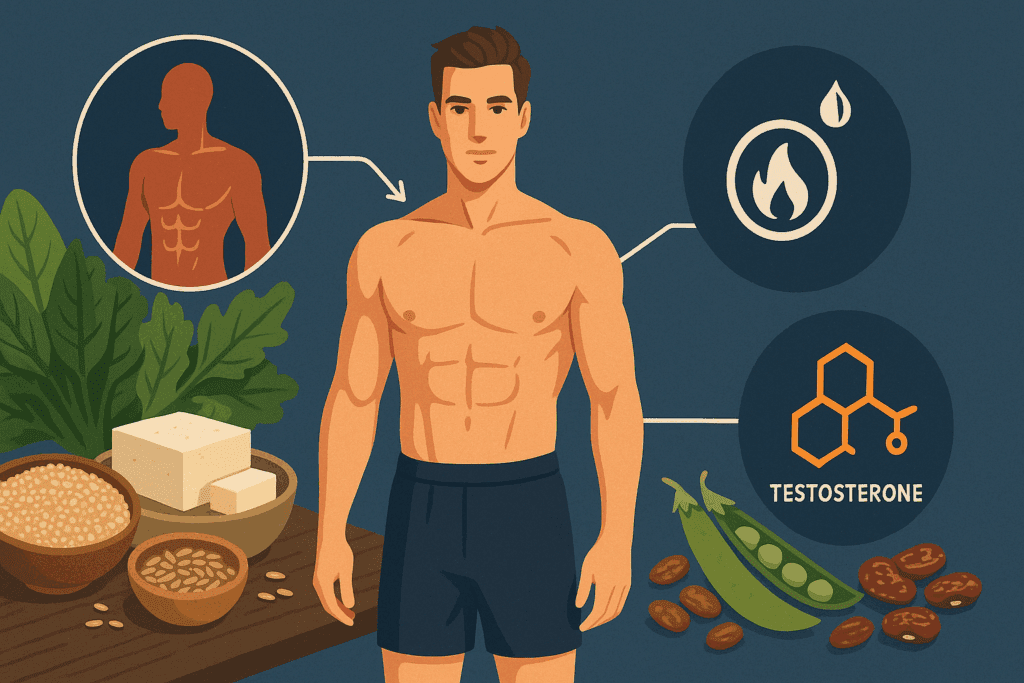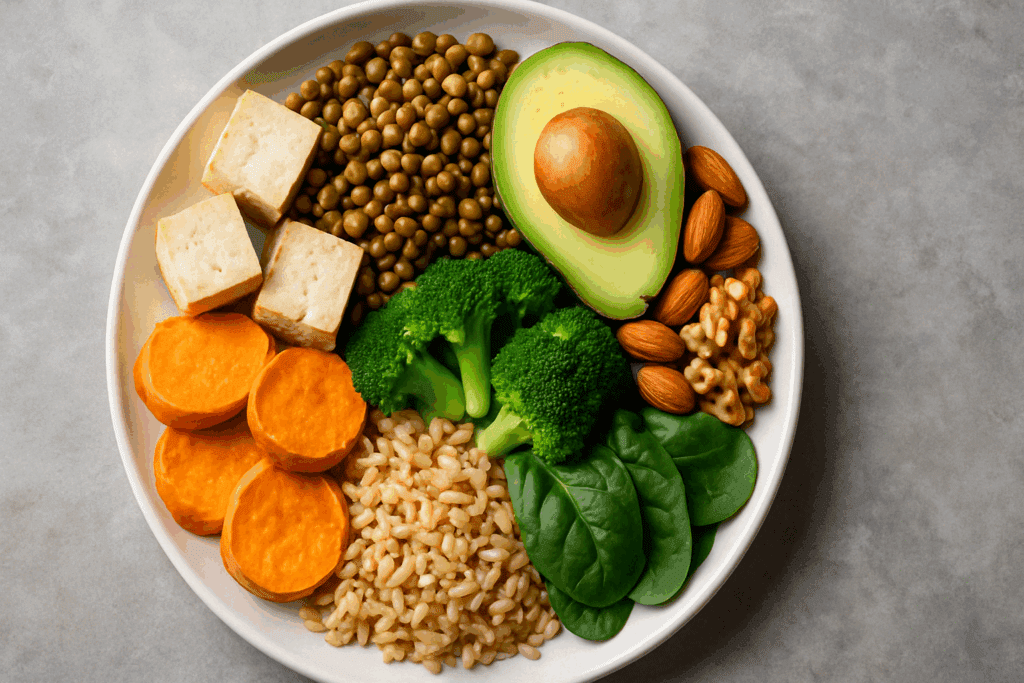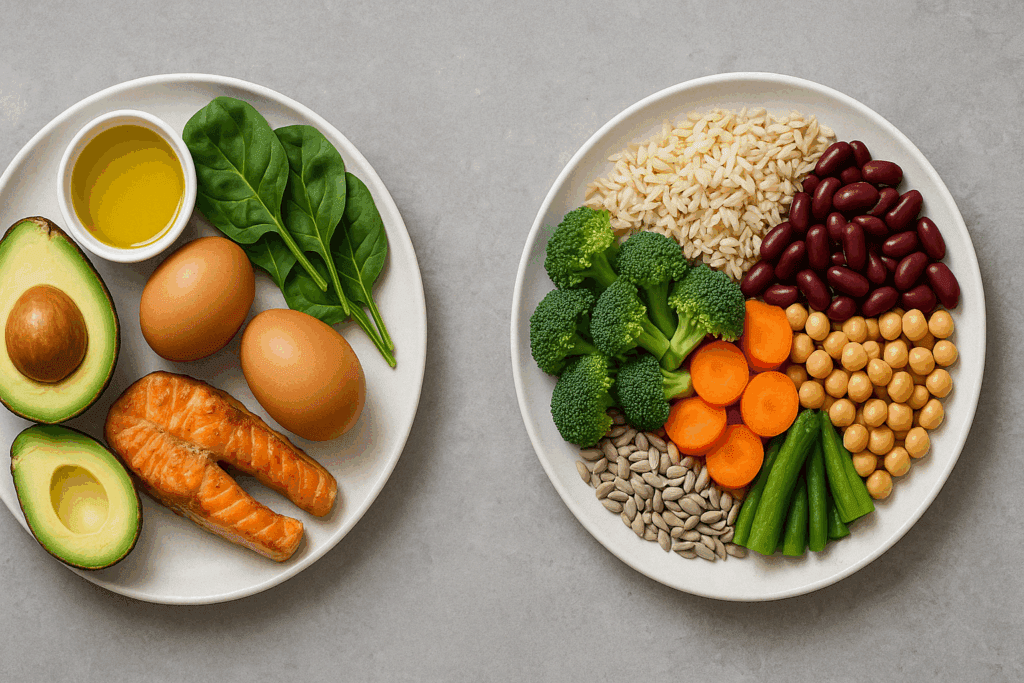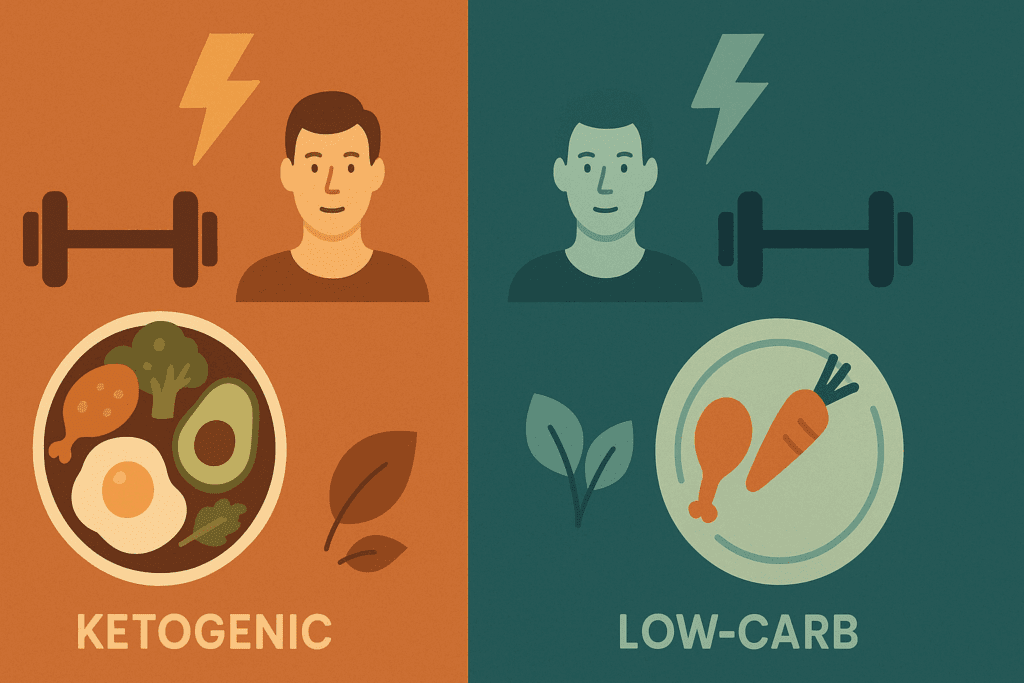Losing weight is not simply about eating less or exercising more; it’s about making scientifically informed, sustainable changes that support long-term health. For men, especially, tailoring a strategy that supports muscle preservation, metabolic function, and hormonal balance is key to shedding fat without compromising vitality. A well-designed male nutrition plan does more than help you lose weight—it promotes overall health, optimizes energy levels, and reduces the risk of chronic disease. In this guide, we explore how healthy meal plans for men can serve as the foundation for a realistic and effective fat loss journey.
You may also like: Smart Meal Prep for Weight Loss: Expert-Approved Lunch Ideas and Recipes to Stay on Track
Understanding the Fundamentals of a Male Nutrition Plan
Men have distinct nutritional needs compared to women due to differences in body composition, hormonal profiles, and metabolism. A sound male eating plan accounts for higher muscle mass and basal metabolic rate, which means men often require more calories to maintain energy while still reducing fat.
A diet food plan for men should include ample lean protein sources to preserve lean body mass, especially when in a caloric deficit. At the same time, healthy fats and complex carbohydrates must be thoughtfully included to support testosterone levels and fuel physical activity. Micronutrient sufficiency is also non-negotiable—deficiencies in key nutrients like vitamin D, magnesium, and zinc can interfere with metabolism, energy, and mood, undermining progress.
Crucially, any successful fat loss diet plan for male individuals must prioritize consistency and sustainability. Fad diets may yield short-term results but often fall short in delivering sustainable health benefits. The goal is to create a lifestyle pattern that fosters long-term wellness, not just rapid weight loss.

Why One-Size-Fits-All Weight Loss Plans for Men Often Fail
A common pitfall in many commercial weight loss plans for men is the generic approach they take. These plans often ignore individual differences in body type, metabolism, activity level, and food preferences. What works for a sedentary office worker with a slower metabolism may not be ideal for an active individual with high energy demands.
More importantly, psychological and behavioral factors must be taken into account. Meal plans that are too restrictive or monotonous often lead to binge episodes, frustration, or abandonment of the plan altogether. A practical male eating plan should be flexible enough to accommodate real-life situations—business lunches, social gatherings, or weekend indulgences—without derailing progress.
Moreover, research shows that adherence is the biggest predictor of long-term success. The best meal plan for men is one that they can actually stick to—not the one that promises the fastest results. A science-backed plan prioritizes nutrient density, portion control, and gradual habit formation over extreme deprivation.
Shed Fat Diet Plan Strategies That Actually Work
Creating a shed fat diet plan that’s effective and sustainable begins with striking the right caloric balance. This involves consuming slightly fewer calories than your body burns while maintaining sufficient intake of protein, healthy fats, and fiber. The goal is to reduce fat stores while preserving or even increasing lean muscle mass.
Protein should be at the forefront. Numerous studies have demonstrated that high-protein diets enhance satiety, increase thermogenesis, and preserve muscle during fat loss phases. Lean sources like tofu, tempeh, legumes, seitan, and lentils make excellent choices, particularly within a whole-food plant-based framework.
Another critical component is fiber-rich vegetables and whole grains. These foods help regulate blood sugar, improve digestion, and reduce overall calorie intake by promoting fullness. Unlike many low-nutrient, high-sugar options found in ultra-processed diets, whole plant foods deliver long-lasting energy and essential nutrients without the crash.
Meal frequency and timing also matter. While intermittent fasting works for some, others may benefit from consistent meals throughout the day to stabilize energy and avoid overeating. The key is finding a rhythm that supports your lifestyle and metabolism.

Designing Healthy Meal Plans for Men: Core Principles
The most effective healthy meal plans for men follow a few key principles: balance, simplicity, and variety. Each meal should feature a combination of macronutrients—protein, fats, and carbs—with an emphasis on nutrient density.
Start with a plant-based protein foundation. Add in fiber-rich vegetables and legumes, healthy fats like nuts, seeds, and avocado, and whole grains such as quinoa or brown rice. This structure not only provides satiety but also helps maintain muscle and hormonal health during weight loss.
Portion control is another vital element. Oversized portions, even of healthy foods, can hinder progress. Learning to listen to internal hunger and satiety cues is more effective than rigid calorie counting in the long run.
A good male nutrition plan also accounts for food preparation and convenience. Batch cooking, meal prepping, and choosing minimally processed options help streamline healthy eating in a busy lifestyle. The more accessible your meals are, the more likely you are to stick to your plan.
Fat Loss and the Keto Controversy: Is Keto a Good Diet for Men?
The ketogenic diet has gained popularity as a rapid weight loss strategy, but is keto a good diet for men in the long run? That depends on the individual and how the diet is implemented. While the keto diet promotes fat loss by shifting the body into a state of ketosis, it may not be the most sustainable or balanced option for every male.
One key debate is the comparison of ketogenic diet vs low carb plans. Both limit carbohydrates, but keto restricts them far more severely. The typical keto diet includes fewer than 50 grams of carbs per day, while a low carb diet might allow 100 to 150 grams. Understanding the nuances of low carb diet keto diet comparisons is essential for determining which—if either—suits a man’s lifestyle, activity level, and nutritional needs.
Another point of discussion is whether keto is a low carb diet by definition. Technically, it is, but not all low carb diets are keto. For men looking to maintain muscle, exercise regularly, and consume a wide variety of plant foods, a more moderate carb approach may be preferable. The question isn’t just “is keto a low carb diet” but rather, is keto a sustainable and health-promoting way of eating?
Scientific literature increasingly questions: is a keto diet sustainable over time? Some studies suggest potential short-term benefits, but long-term adherence remains a challenge due to restrictive food choices and nutrient gaps. This leads to another concern—if is keto no carbs or simply very low in carbs, it still often results in low fiber intake, which is problematic for digestive and metabolic health.

Comparing Ketogenic Diet vs Low Carb Approaches in a Male Eating Plan
For men aiming to lose fat while preserving muscle, comparing the ketogenic diet vs low carb approaches reveals important trade-offs. Keto can produce fast initial weight loss, much of it water weight, but it may impair performance in high-intensity workouts due to glycogen depletion.
A low carb diet, on the other hand, allows for greater flexibility, better fiber intake, and may be easier to sustain. Many experts recommend starting with a moderate carbohydrate intake and adjusting based on results and energy levels.
When deciding between a low carb diet and keto diet, men should consider their physical goals, dietary preferences, and metabolic health. For example, plant-based low carb diets that emphasize whole foods may support weight loss while minimizing the risks associated with ultra-low carbohydrate intake.
Ultimately, a male nutrition plan should evolve with your body’s needs. Whether you’re experimenting with keto or opting for a more balanced approach, the plan must be personalized, evidence-based, and adjustable over time.

Sample Meal Plan for Men Focused on Fat Loss and Nutrient Density
Creating a practical, effective meal plan for men starts with whole foods, strategic macronutrient balance, and realistic meal timing. Here’s a simplified sample day for a whole-food, plant-based approach that aligns with a shed fat diet plan:
Breakfast: Tofu scramble with spinach, bell peppers, and mushrooms; side of steel-cut oats with ground flaxseed and blueberries.
Lunch: Lentil quinoa bowl with roasted sweet potatoes, broccoli, tahini dressing, and pumpkin seeds.
Dinner: Chickpea curry with brown rice, kale salad with olive oil and lemon dressing, and a small serving of fruit.
Snacks (optional): A handful of almonds, a plant-based protein smoothie, or hummus with raw veggies.
This kind of diet food plan for men offers high-quality protein, fiber, essential fats, and antioxidants without excessive calories. It promotes satiety, supports metabolic health, and avoids the processed foods that undermine many weight loss efforts.
Is Keto a Low Carb Diet or Something More Restrictive?
While keto is often described as a low carb diet, it is far more restrictive than most traditional low carb approaches. Understanding the distinction matters because many men mistakenly believe that going “low carb” automatically means going keto. In reality, keto is just one end of the carbohydrate-restriction spectrum.
A low carb diet keto diet conversation should consider how each affects energy levels, workout performance, and micronutrient intake. Is keto a good diet for active men? Only if they carefully manage electrolytes, fiber, and calories to avoid common pitfalls such as fatigue, muscle cramps, and reduced endurance.
Is keto no carbs? Not entirely. Most keto plans allow small amounts of carbs from non-starchy vegetables. However, they typically exclude legumes, whole grains, and fruits—all foods with proven health benefits. Men following a keto diet must take care to avoid nutritional deficiencies and assess whether the plan aligns with their long-term goals.
Balancing Real Life with Structured Weight Loss Plans for Men
A sustainable weight loss strategy must fit within the context of a man’s daily responsibilities, social obligations, and food environment. Overly rigid diet plans that prohibit entire food groups or require meticulous tracking often lead to burnout. Flexibility, rather than perfection, is the secret to long-term adherence.
Incorporating occasional indulgences into a healthy meal plan for men can actually improve compliance. Social meals, business travel, or spontaneous cravings don’t have to derail progress as long as the core structure of the plan remains intact.
This is why personalization is essential. The best weight loss plans for men are not only built on nutritional science but also respect psychological factors and lifestyle preferences. From choosing a shed fat diet plan to navigating the ketogenic diet vs low carb options, the focus should be on developing skills and habits that last.

FAQ: Advanced Insights Into Weight Loss Plans and Nutrition Strategies for Men
1. What psychological factors should men consider when following a fat loss diet plan?
While many men focus solely on calorie counting and macros, psychological readiness plays a critical role in the success of any fat loss diet plan for male individuals. Emotional eating, body image expectations, and stress management can sabotage even the most structured male nutrition plan. Mindful eating strategies—such as pausing before meals, recognizing hunger cues, and reducing distractions—help improve self-regulation and long-term adherence. Support systems, whether through accountability partners or digital coaching, can significantly improve outcomes. Men are more likely to stay consistent when their weight loss plans for men align with their lifestyle, values, and daily stress levels, not just their caloric goals.
2. How can men tailor their diet food plan based on body composition and metabolism?
Generic calorie targets often ignore the nuances of muscle mass, hormonal levels, and metabolic rate. For a personalized diet food plan for men, it’s essential to assess basal metabolic rate (BMR) and lean body mass through tools like DEXA scans or bioelectrical impedance. A higher muscle-to-fat ratio allows for greater caloric intake without fat gain, which is a core consideration in building an effective shed fat diet plan. High-protein meals, distributed evenly throughout the day, support muscle retention while creating a caloric deficit. Tailoring a male eating plan to individual metabolic feedback also helps prevent energy crashes and improves long-term sustainability.
3. Are intermittent fasting strategies effective for male weight loss?
Yes, intermittent fasting can be a powerful tool when integrated into a well-designed fat loss diet plan for male individuals. It supports insulin sensitivity, promotes fat oxidation, and simplifies eating routines. However, its effectiveness depends on how well it complements the broader male nutrition plan—fasting alone won’t overcome poor food quality or inconsistent caloric intake. Many men succeed with a 16:8 fasting window combined with high-fiber, protein-rich meals. When thoughtfully integrated into healthy meal plans for men, intermittent fasting can enhance satiety, reduce snacking, and streamline dietary discipline.
4. How does resistance training impact a male eating plan?
Resistance training is essential for preserving lean muscle during weight loss, which makes it a cornerstone of any effective male eating plan. It raises resting metabolic rate, improves glucose uptake, and supports hormonal balance. Diet food plans for men that include ample plant-based protein, healthy fats, and complex carbs post-workout can significantly improve recovery and body composition. Men who lift regularly require a slightly higher caloric intake to support muscle retention—especially during cutting phases in a shed fat diet plan. Timing nutrient-dense meals around training windows can maximize muscle protein synthesis and reduce fat gain.
5. What are some underestimated foods that support male fat loss?
While chicken and broccoli dominate many weight loss plans for men, underappreciated foods like legumes, fermented vegetables, chia seeds, and tempeh offer metabolic advantages. These whole foods support gut health, regulate appetite hormones, and improve nutrient absorption. In a male nutrition plan, adding such functional foods can reduce inflammation and improve insulin sensitivity, both of which are critical for shedding visceral fat. Many healthy meal plans for men overlook fiber diversity, which is essential for gut-brain signaling and long-term satiety. Including a broader spectrum of plant-based foods can make any fat loss diet plan for male individuals more effective and enjoyable.
6. How can men sustain weight loss without metabolic slowdown?
Sustained weight loss often leads to adaptive thermogenesis, where the body reduces energy expenditure. To counter this, men should periodically reintroduce maintenance-calorie phases, also known as “diet breaks,” within their weight loss plans for men. These short-term increases in food intake help stabilize hormones like leptin and ghrelin and may prevent long-term metabolic suppression. Incorporating progressive strength training and ensuring adequate protein intake are also essential parts of a resilient diet food plan for men. This metabolic cycling approach supports a male eating plan that is both sustainable and hormonally balanced over time. Flexibility and psychological variety are key for adherence without burnout.
7. What role does sleep play in a fat loss diet plan for men?
Sleep is a major—yet often overlooked—component of any male nutrition plan. Poor sleep quality increases cortisol levels, reduces insulin sensitivity, and triggers cravings for high-calorie foods. These physiological changes can derail even the most disciplined shed fat diet plan. Research shows that men who sleep fewer than six hours a night tend to experience slower fat loss, especially around the abdomen. To optimize healthy meal plans for men, prioritize consistent sleep hygiene practices such as minimizing blue light before bed, keeping a regular sleep schedule, and avoiding stimulants late in the day.
8. How can men handle plateaus during a weight loss journey?
Plateaus are common in long-term weight loss plans for men, but they are not signs of failure—they’re feedback. A smart adjustment might involve increasing non-exercise activity (like walking), reducing portion sizes slightly, or improving meal timing. Sometimes the body just needs a shift, not a stricter diet. A fat loss diet plan for male success should allow for reevaluation every few weeks to maintain progress. Keeping a food and mood journal can help uncover hidden sources of excess calories or stress that may stall results and allow for more responsive male nutrition plan adjustments.
9. What are the most sustainable meal planning habits for long-term fat loss?
Sustainability is the differentiator between short-term dieting and lasting transformation. A sustainable meal plan for men should focus on simplicity, batch cooking, and having go-to meals that are enjoyable and nutritionally balanced. Men benefit from structuring meals around high-fiber carbs, lean plant-based proteins, and healthy fats to control hunger and maintain energy. Including flexibility—such as one free meal per week—prevents diet fatigue and supports long-term compliance in a shed fat diet plan. Over time, building a personal “food toolbox” of easy, nutrient-dense meals reinforces consistency and success.
10. How do age and testosterone levels affect weight loss in men?
As men age, testosterone levels decline naturally, leading to reduced muscle mass, slower metabolism, and increased fat retention. This hormonal shift makes a targeted fat loss diet plan for male individuals even more important. A strong male nutrition plan for men over 40 should prioritize resistance training, vitamin D, zinc, and healthy fats to support hormonal health. Additionally, diet food plans for men should adjust caloric intake to reflect changes in basal energy needs without compromising protein or micronutrient density. Age isn’t a barrier—it’s a variable that requires smarter planning within the context of healthy meal plans for men.

Conclusion: Why Smart Weight Loss Starts with the Right Male Nutrition Plan
Effective fat loss isn’t about chasing trends or adopting the most extreme diet. It’s about selecting a male nutrition plan that supports your physiology, lifestyle, and long-term health. Whether you’re considering a keto diet, a low carb approach, or a balanced whole-food plan, the foundation should be built on evidence-based nutrition tailored to male needs.
Healthy meal plans for men should prioritize protein-rich whole foods, sustainable calorie control, and nutrient diversity. They should also align with your energy demands, workout schedule, and personal values. Rather than asking, “is keto a low carb diet,” ask whether the plan you’re following is sustainable, nutritionally complete, and adaptable to real life.
Smart weight loss doesn’t just shed pounds—it improves performance, mood, and longevity. The right male eating plan does more than transform your physique; it strengthens your commitment to lifelong health.
With a focus on consistency, personalization, and the latest science, a well-crafted diet food plan for men is the most powerful tool in the journey to sustainable fat loss and overall well-being.
Was this article helpful? Don’t let it stop with you. Share it right now with someone who needs to see it—whether it’s a friend, a colleague, or your whole network. And if staying ahead on this topic matters to you, subscribe to this publication for the most up-to-date information. You’ll get the latest insights delivered straight to you—no searching, no missing out.
Further Reading:
10 of the Best Weight Loss Eating Patterns for Men
Diet Chart for Weight Loss for Both Men and Women
The 40 Best Ways to Lose Weight—and Keep It Off
Disclaimer
The information contained in this article is provided for general informational purposes only and is not intended to serve as medical, legal, or professional advice. While NewsHealthWatch strives to present accurate, up-to-date, and reliable content, no warranty or guarantee, expressed or implied, is made regarding the completeness, accuracy, or adequacy of the information provided. Readers are strongly advised to seek the guidance of a qualified healthcare provider or other relevant professionals before acting on any information contained in this article. NewsHealthWatch, its authors, editors, and contributors expressly disclaim any liability for any damages, losses, or consequences arising directly or indirectly from the use, interpretation, or reliance on any information presented herein. The views and opinions expressed in this article are those of the author(s) and do not necessarily reflect the official policies or positions of NewsHealthWatch.

